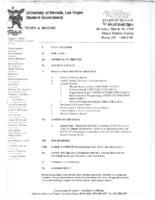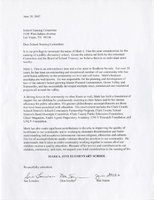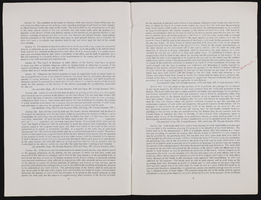Search the Special Collections and Archives Portal
Search Results
Ruthe Deskin Papers
Identifier
Abstract
The Ruthe Deskin Papers (1933-2004) document Deskin's career as a journalist and community activist in Nevada. The papers include Deskin's "Back and Forth" columns, newspaper articles about Deskin, awards and certificates, legal documents, correspondence, photographs, obituaries and memorials, convention programs from the Nevada Press Association, and biographical ephemera. The collection also contains certificates recognizing Deskin's work with Nevada youth from Greenspun Junior High School and Ruthe Deskin Elementary School, as well as the Boy Scouts of America and the Clark County Juvenile Court.
Archival Collection
Mildred Mann Papers
Identifier
Abstract
The Mildred Mann Papers (1915-1995) contain documents related to her involvement in teaching ceramics and her work with the Independent Order of Odd Fellows. Included are correspondence, newspaper clippings, magazines, certificates, childhood school materials, manuals, photographs, a scrapbook, and newsletters. There are also Clark County Community College (CCCC) class schedules, real estate papers, and membership lists.
Archival Collection
Julian Taber Collection on Gambling Addiction
Identifier
Abstract
The Julian Taber Collection on Gambling Addiction (1977-1988) includes papers, proposals, internal reports, memoranda, and newspaper articles chronicling the work of Julian Taber, an early specialist in the field of gambling addiction. The majority of the collection relates to Taber’s work and pilot programs at the Brecksville Veterans Administration (VA) Hospital in Brecksville, Ohio, with select materials pertaining to an alcohol dependency treatment program he coordinated at the VA hospital in Reno, Nevada.
Archival Collection
Las Vegas High School Class of 1929 Collection
Identifier
Abstract
The Las Vegas High School Class of 1929 Collection (1921-1979) contains materials relating to the Las Vegas High School graduating class of 1929. Materials include a scrapbook with photographs, pamphlets, fliers, and newspaper clippings from the thirtieth, fortieth, forty-fifth, and fiftieth reunions, as well as poster boards and oversized photographs from the 1920s.
Archival Collection
Allied Arts Council of Southern Nevada Records
Identifier
Abstract
The Allied Arts Council of Southern Nevada (AACSN) Records are comprised of the organizational records of the Allied Arts Council, a Las Vegas, Nevada-based non-profit organization that promoted the arts and cultural life in Southern Nevada from 1971 to 1999. Materials include meeting minutes, financial records, correspondence, membership information, publications, event information, project files, photographs, audio cassettes, VHS, and U-Matic tapes.
Archival Collection

Epilogue: Nevada Southern University Yearbook, 1968
Date
Description
Yearbook main highlights: schools and departments; detailed lists with names and headshots of faculty, administration and students; variety of photos from activities, festivals, campus life, and buildings; campus organizations such as sororities, fraternities and councils; beauty contest winners; college sports and featured athletes; and printed advertisements of local businesses; Institution name: Nevada Southern University, Las Vegas, NV
Mixed Content

Meeting minutes for Consolidated Student Senate University of Nevada, Las Vegas, March 16, 1998
Date
Archival Collection
Description
Text

Transcript of interview with Lilly Fong by Annie Yuk-Siu Shum, February 29, 1980
Date
Archival Collection
Description
Text

Application and supporting documents for the naming of Mark L. Fine Elementary School, 2007
Date
Archival Collection
Description
The application and supporting documents provide details about Mark Fine and his contributions to Clark County and Las Vegas, Nevada. There are letters of support from many members of the community, including his children and elected officials, and from leaders in religious groups, non-profit organizations and business enterprises.
Text

